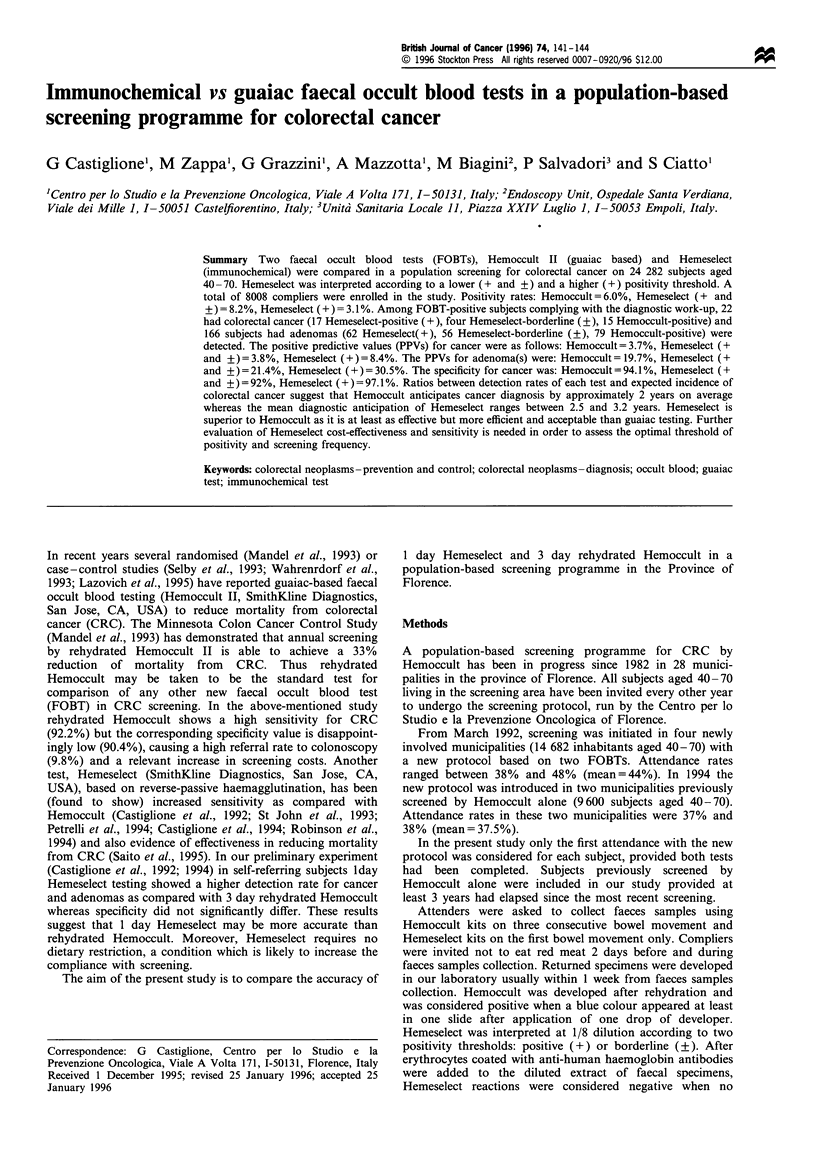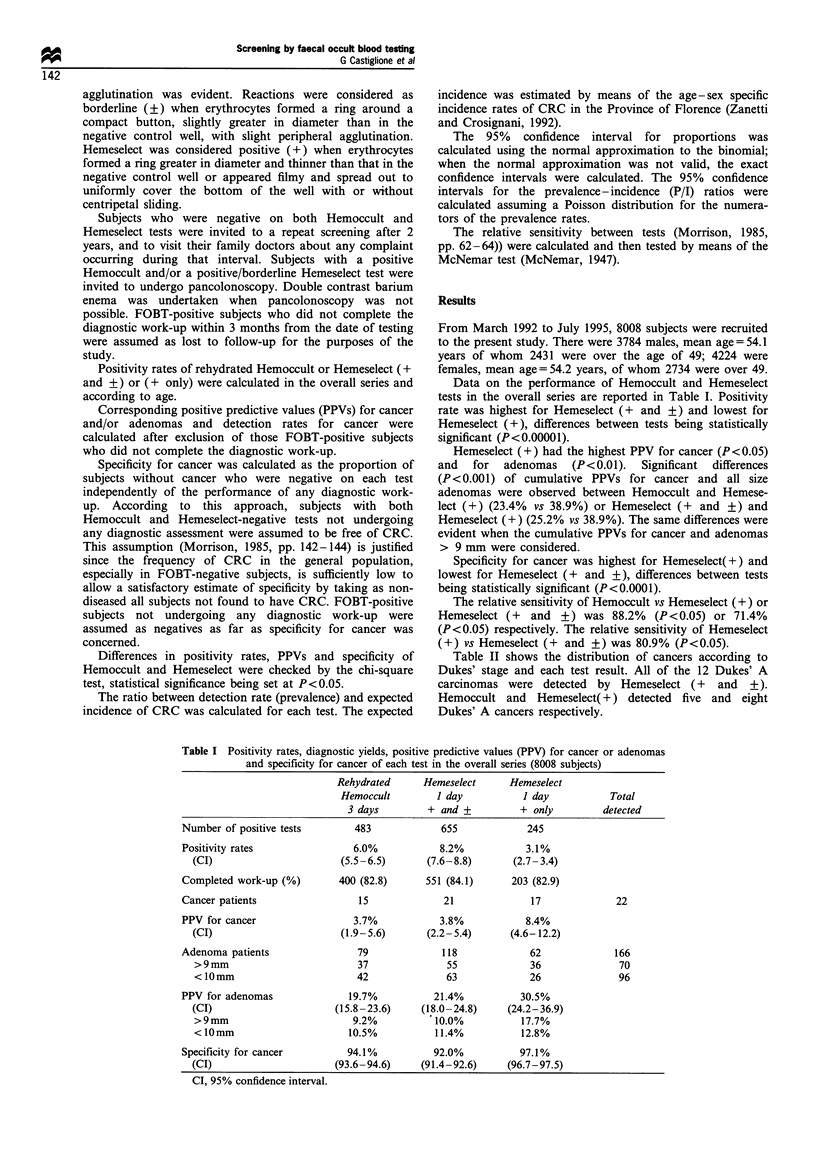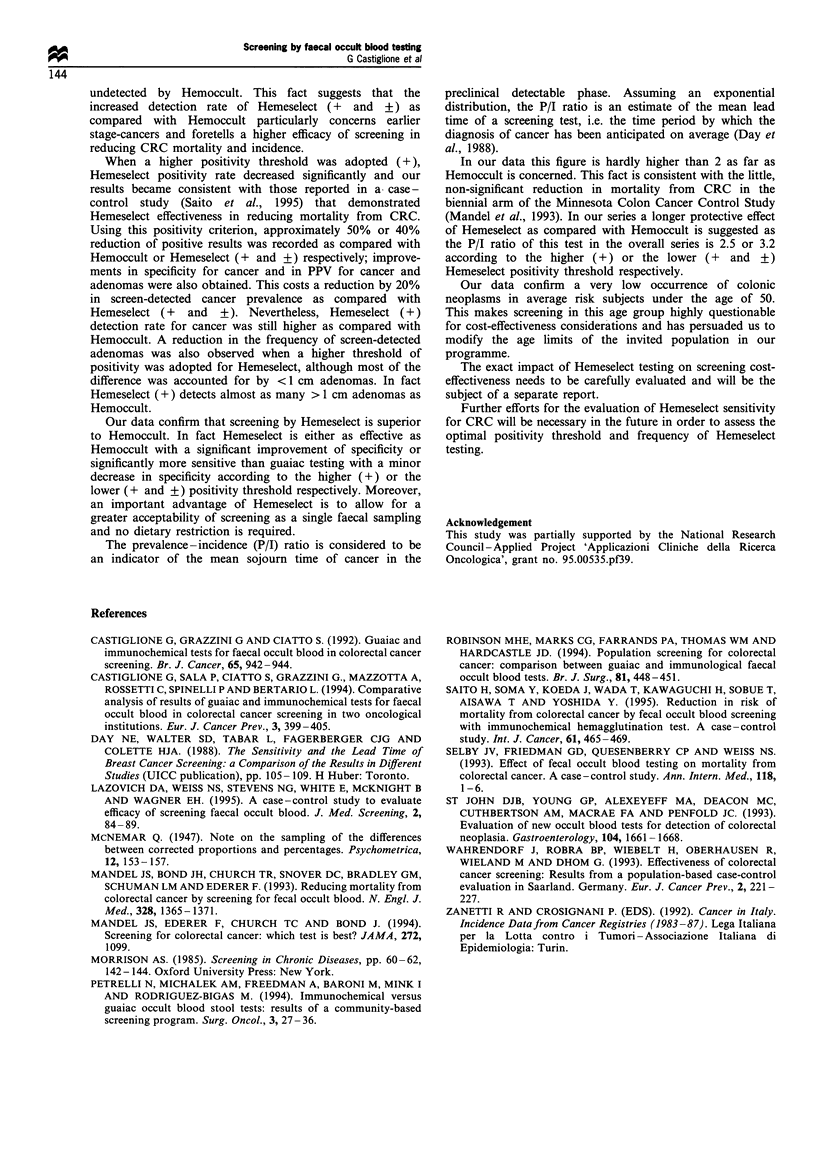Abstract
Two faecal occult blood tests (FOBTs), Hemoccult II (guaiac based) and Hemeselect (immunochemical) were compared in a population screening for colorectal cancer on 24 282 subjects aged 40-70. Hemeselect was interpreted according to a lower (+ and +/-) and a higher (+) positivity threshold. A total of 8008 compliers were enrolled in the study. Positivity rates: Hemoccult = 6.0%, Hemeselect (+ and +/) = 8.2%, Hemeselect (+) = 3.1%. Among FOBT-positive subject complying with the diagnostic work-up, 22 had colorectal cancer (17 Hemeselect-positive (+), four Hemeselect-borderline (+/-), 15 Hemoccult-positive) and 166 subjects had adenomas (62 Hemeselect(+), 56 Hemeselect-borderline (+/-), 79 Hemoccult-positive) were detected. The positive predictive values (PPVs) for cancer were as follows: Hemoccult = 3.7%, Hemeselect (+ and +/-) = 3.8%, Hemeselect (+) = 8.4%. The PPVs for adenoma(s) were: Hemoccult = 19.7%, Hemeselect (+ and +/-) = 21.4%, Hemeselect (+) = 30.5%. The specificity for cancer was: Hemoccult = 94.1%, Hemeselect (+ +/-) = 92%, Hemeselect (+) = 97.1%. Ratios between detection rates of each test and expected incidence of colorectal cancer suggest that Hemoccult anticipates cancer diagnosis by approximately 2 years on average whereas the mean diagnostic anticipation of Hemeselect ranges between 2.5 and 3.2 years. Hemeselect is superior to Hemoccult as it is at least as effective but more efficient and acceptable than guaiac testing. Further evaluation of Hemeselect cost-effectiveness and sensitivity is needed in order to assess the optimal threshold of positivity and screening frequency.
Full text
PDF



Selected References
These references are in PubMed. This may not be the complete list of references from this article.
- Castiglione G., Sala P., Ciatto S., Grazzini G., Mazzotta A., Rossetti C., Spinelli P., Bertario L. Comparative analysis of results of guaiac and immunochemical tests for faecal occult blood in colorectal cancer screening in two oncological institutions. Eur J Cancer Prev. 1994 Sep;3(5):399–405. doi: 10.1097/00008469-199409000-00003. [DOI] [PubMed] [Google Scholar]
- Deineko V. S. Sokratitel'naia funktsiia miokarda i urovn' elektrolitov v plazme krovi i eritrotsitakh u bol'nykh s nefroticheskoi formoi khronicheskogo diffuznogo glomerulonefrita. Vrach Delo. 1973 Feb;2:90–93. [PubMed] [Google Scholar]
- Lazovich D., Weiss N. S., Stevens N. G., White E., McKnight B., Wagner E. H. A case-control study to evaluate efficacy of screening for faecal occult blood. J Med Screen. 1995;2(2):84–89. doi: 10.1177/096914139500200206. [DOI] [PubMed] [Google Scholar]
- Mandel J. S., Bond J. H., Church T. R., Snover D. C., Bradley G. M., Schuman L. M., Ederer F. Reducing mortality from colorectal cancer by screening for fecal occult blood. Minnesota Colon Cancer Control Study. N Engl J Med. 1993 May 13;328(19):1365–1371. doi: 10.1056/NEJM199305133281901. [DOI] [PubMed] [Google Scholar]
- Mandel J. S., Ederer F., Church T., Bond J. Screening for colorectal cancer: which test is best? JAMA. 1994 Oct 12;272(14):1099–1100. doi: 10.1001/jama.272.14.1099b. [DOI] [PubMed] [Google Scholar]
- Petrelli N., Michalek A. M., Freedman A., Baroni M., Mink I., Rodriguez-Bigas M. Immunochemical versus guaiac occult blood stool tests: results of a community-based screening program. Surg Oncol. 1994 Feb;3(1):27–36. doi: 10.1016/0960-7404(94)90021-3. [DOI] [PubMed] [Google Scholar]
- Robinson M. H., Marks C. G., Farrands P. A., Thomas W. M., Hardcastle J. D. Population screening for colorectal cancer: comparison between guaiac and immunological faecal occult blood tests. Br J Surg. 1994 Mar;81(3):448–451. doi: 10.1002/bjs.1800810343. [DOI] [PubMed] [Google Scholar]
- Saito H., Soma Y., Koeda J., Wada T., Kawaguchi H., Sobue T., Aisawa T., Yoshida Y. Reduction in risk of mortality from colorectal cancer by fecal occult blood screening with immunochemical hemagglutination test. A case-control study. Int J Cancer. 1995 May 16;61(4):465–469. doi: 10.1002/ijc.2910610406. [DOI] [PubMed] [Google Scholar]
- St John D. J., Young G. P., Alexeyeff M. A., Deacon M. C., Cuthbertson A. M., Macrae F. A., Penfold J. C. Evaluation of new occult blood tests for detection of colorectal neoplasia. Gastroenterology. 1993 Jun;104(6):1661–1668. doi: 10.1016/0016-5085(93)90643-q. [DOI] [PubMed] [Google Scholar]
- Wahrendorf J., Robra B. P., Wiebelt H., Oberhausen R., Weiland M., Dhom G. Effectiveness of colorectal cancer screening: results from a population-based case-control evaluation in Saarland, Germany. Eur J Cancer Prev. 1993 May;2(3):221–227. [PubMed] [Google Scholar]


